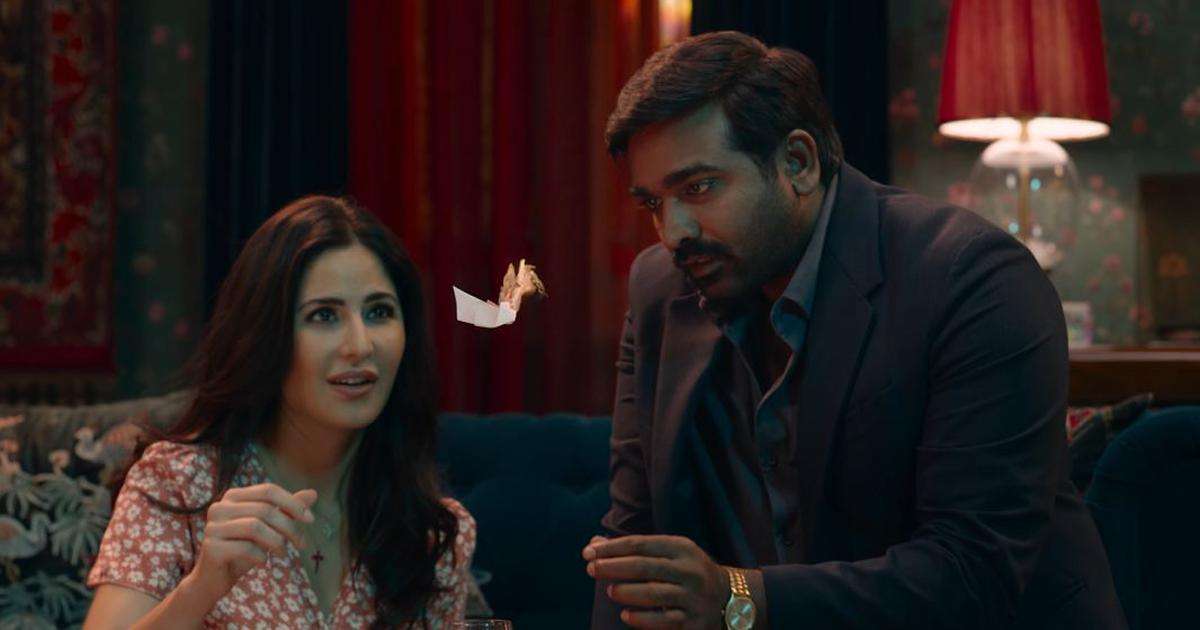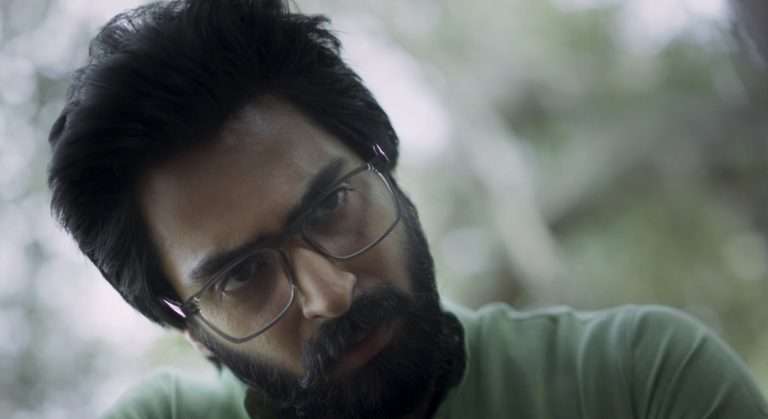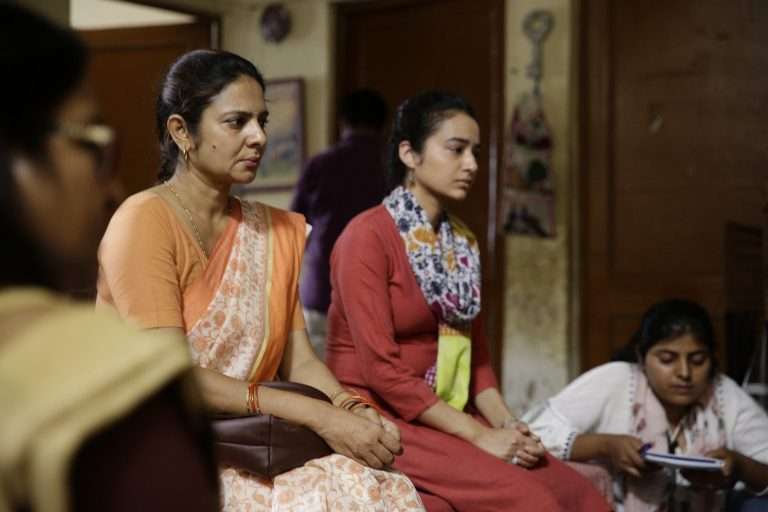As a filmmaker, Sriram Raghavan has that rare ability to surprise you when you least expect it. An avid follower of crime fiction and noir masters such as Alfred Hitchcock, Brian De Palma and Vijay Anand, Raghavan’s body of work over the past two decades – with films such as “Ek Hasina Thi” (2004), “Johnny Gaddaar” (2007), “Badlapur” (2015), and the smash hit “Andhadhun” (2018) – has earned him the unofficial tag of the ‘Master of Suspense’ in Hindi cinema. This moniker is justified, for there is no one quite like Raghavan, currently working in Hindi cinema, who understands how to craft a suspense story, seamlessly interpolating references from European, American, and Hindi filmmakers of the past. But, as I found out this week, Raghavan, that sly devil, was holding one more ace up his sleeve.
“Merry Christmas” (2024) is Raghavan’s sixth Hindi feature film, and with this film, he completes two decades in Hindi cinema as a feature filmmaker. I thought that by this point, I was ready for whatever surprises he could throw my way. Turns out, I was wrong. That “Merry Christmas” would be a different kind of film than what we’ve come to associate with Raghavan thus far, as hinted at the very beginning when French filmmaker Éric Rohmer got a mention as a ‘thank you.’
As one of the leading figures of the French New Wave, Rohmer’s films – such as the “Six Moral Tales” and the “Tales of the Four Seasons” (the latter being recently digitally restored by Criterion) – have continued to influence contemporary filmmakers. Two of the most interesting films from last year, Ira Sachs’ “Passages” and Christian Petzold’s “Afire,” can trace their genesis back to Rohmer’s aesthetics. And yet, the question that loomed over “Merry Christmas” was an obvious one: what could Rohmer contribute to the world of noir? In what world can the sensibilities of crime fiction and Rohmer, with such contrasting approaches to seeing the world, co-exist in a happy marriage? In many ways, “Merry Christmas” is an interesting attempt to answer this question.
Set in a bygone era – as the film puts it, “when Mumbai was called Bombay” – Raghavan’s “Merry Christmas” follows Albert (a restrained Vijay Sethupathi whose choices of silence communicate more than any piece of dialogue ever could), who returns to his family home in Bombay on Christmas Eve upon the passing of his mother. His neighbor (a delightful Tinnu Anand) assures him that fate has brought him back, and it must have something in store for him.
Still processing the news of his mother’s loss, Albert decides to venture out on his own to a nearby restaurant where he crosses paths with Maria (Katrina Kaif in a career-best performance), a presumably single mother with a young daughter who cannot speak. Sensing each other’s loneliness at a time when almost everyone around them has someone for company, Albert and Maria use this chance encounter to not be alone in the holiday season. But as Albert and Maria discover more about each other, they realize they both carry dark secrets they’d prefer not to disclose.
The source material of this one-night story is by the father of French literary crime fiction, Frédéric Dard, called “Le monte-charge.” I won’t reveal its English-language title because revealing it would spoil the fun regarding how Raghavan incorporates the novel’s English title as an Easter egg in the film. The novel was adapted into a French-language film by Marcel Bluwal in 1962 called “Paris Pick-Up.” Dard himself collaborated with Bluwal on the screenplay for the film adaptation of his novel.
However, much like his earlier films, such as “Badlapur” and “Andhadhun,” Raghavan doesn’t believe in a lift-and-shift adaptation and only uses the source material as a starting point. The only thing that’s similar between “Le monte-charge” and “Merry Christmas” is the premise: a one-night story of a chance encounter between two people hiding their own secrets. Raghavan uses this premise to take his film in a completely different direction that’s very much his own.
Where does Rohmer come in this story that has its seeds in French crime fiction, you ask? Well, this is where Raghavan makes an interesting choice; and mind you, it is a choice – your experience of how much you end up enjoying this film will ultimately depend on whether you are on board with this choice. The choice is as simple as it is daring. Raghavan, along with fellow writers Arijit Biswas, Pooja Ladha Surti, and Anukriti Pandey, takes the premise of his story from Dard but gives his film a Rohmer-like treatment. His two protagonists behave as if they’re in one of Rohmer’s moral fables, questioning the morality of their actions at every juncture while they slowly but surely fall for each other. Spiritually, “Merry Christmas” could very well be the seventh moral tale if Rohmer wanted to add to his “Six Moral Tales.”
And this is the main challenge in reading this film. For those who are new to Raghavan, being introduced to his style through the massively successful “Andhadhun,” are bound to be disappointed. This is not an edge-of-your-seat suspense thriller with something unexpected happening at every turn. If you go in expecting that kind of film, you are setting yourself up for disappointment. For the most part, this is an intimate, romantic drama of two lonely people who find each other through a chance encounter.
We spend the first forty minutes of the film getting to know Albert and Maria as they ‘time travel’ through the streets of a city that no longer exists – those streets of old Bombay and that pre-digital era without mobile phones don’t exist anymore – but this journey through time makes our two protagonists feel less alone as they open up to each other. There’s a fable-like quality to the film’s first half: the chance encounter between two people from different walks of life, traversing the streets of Bombay that isn’t the same anymore, and the back-and-forth introspective probing between our two leads that feels straight out of a Rohmer film, none of it feels real. But that’s precisely the point. It’s not supposed to be.
I would go so far as to say that “Merry Christmas” is the most affecting romantic drama of Hindi cinema in recent times. The fact that this intimate romantic drama is made by Raghavan, whom we most associate with mystery and suspense, and it comes at a point in time when Hindi cinema has all but killed off full-fledged romantic dramas on the big screen, are two of the biggest surprises of 2024 for me (I know, the year’s just begun).
The fact that the film takes its time is something I really appreciated. We’ve just come off a year where the hyper-frenetic pacing and the sheer in-your-face loudness of some of Hindi cinema’s recent theatrical blockbusters such as “Pathaan”, “Gadar 2”, “Jawan,” and “Animal” came daringly close to giving me a brain aneurysm. In such a theatrical environment, where everything is being yelled at the audience at alarming decibels, it was refreshing to see a calm, intimate, and deliberately quiet film in the comfort of a theatre. In interviews, Raghavan has stated that it was a deliberate choice on his part that we spend the early part of the film with these characters, and he was inclined to make a film that ‘takes its time.’
Coming back to the Rohmer-inspired dialogue, “Merry Christmas” spends the beginning portion where our two leads probe each other philosophically and introspect on morally ambiguous choices. It’s obvious that apart from the characters in Rohmer’s films, nobody really has conversations with strangers this way. However, since Raghavan establishes early on that this is meant to be a fable where our characters are undertaking ‘time travel,’ the rules of this universe are different.
“Do you believe in God?” Maria asks Albert as they walk the streets of Bombay. At one point in the film, Albert picks up a copy of Raymond Chandler’s novel called ‘Playback.’ Chandler’s last completed novel before his death, ‘Playback’ features an interesting conversation about belief in an omnipresent being that mirrors the conversation between Albert and Maria.
In ‘Playback,’ a wealthy, aged man called Henry Clarendon IV asks if Detective Philip Marlowe believes in God.
“Do you believe in God, young man?”
When Marlowe replies in the negative, Clarendon continues.
“But you should, Mr. Marlowe. It is a great comfort. We all come to it in the end because we have to die and become dust. Perhaps for the individual that is all, perhaps not.”
There are many other easter eggs in the film that either foreshadow what’s to come or reference the genre of this kind of film. For example, when Albert and Maria are at Regal Cinema, Albert stands in front of a large poster of Alfred Hitchcock’s “Rebecca” (1940), a film that’s partially about a young woman going to extreme lengths to secure her freedom – mirroring the choice that Maria must make at a later point in the film. There is a reference to Franz Lehár’s operetta “The Merry Widow,” a comedic and frothy romance between two unlikely people that gets interrupted due to an unexpected mishap – mirroring the direction and broader trajectory of Albert and Maria’s romance, with complications that lie ahead.
Not one to miss a punchline, Raghavan finds the perfect moment to insert RD Burman’s composition from the film “Raja Rani” (1973), ‘Jab Andhera Hota Hai,’ that made me almost choke on my soft drink with laughter. With plenty of easter eggs interspersed throughout, I can go on and on. Raghavan loyalists will find that to be a great reason to revisit the film. However, not being clued in with all the references doesn’t hamper one’s experience of the film. Since this isn’t a film that relies on suspense or a ‘twist’ ending but rather on a slow-burn chemistry that simmers slowly between the two leads, there’s enough here to revisit the film at a later stage, even after you’ve seen it once.
Talking about performances, “Merry Christmas” is carried by the exemplary chemistry between Kaif (Maria) and Sethupathi (Albert). Kaif, in particular, shines in this film as the mother of a young daughter wrestling with the inner conflict of a morally dubious choice she has to make while also developing feelings for a stranger she’s just met that might complicate her future.
I will die on this hill in making this ambitious claim that Kaif has better chemistry with Sethupathi than any of her past Hindi film male co-actors. In Sethupathi, Kaif finds a giving co-actor, and the comfort they share with each other makes their chemistry sincere and believable. There’s a beautiful scene where Kaif and Sethupathi break into an impromptu dance, and the ‘unchoreographed’ nature of it communicates a kind of authenticity that brings a smile to my face. Of course, Albert and Maria are not the kind of people who would break into a rehearsed dance sequence like other Hindi film leads. They danced like their characters would, retaining a kind of goofy-ness that was unabashed and endearing.
As Albert, Sethupathi plays a character whose softness hides a darker and meaner streak within. The writers also give him some incredibly funny zingers that he delivers with aplomb. Two of my favorites are: “Life mein bahut kuchh chhoda hai but chilled beer kabhi nahin chhodi” (I’ve left many things in life, but never chilled beer), and special mention for “Fermented kuchh bhi chalega, except dosa batter” (Anything fermented is fine, except dosa batter).
Much like other Raghavan films, the songs here are used in a situational capacity. I was particularly fond of the lyrics of ‘Raat Akeli Thi,’ penned by Varun Grover, that encapsulates the ‘chance encounter of two strangers’ trope this film relies on through a poetic ‘question-answer’ style of a conversational song. Much like the overall fable-like quality of the film, this idea of telling a story within the story via call and response feels like a song from a bygone era that’s not in vogue today.
“Merry Christmas” is a quiet and intimate film that demands patience from the audience for the payoff to arrive. There is a neat mystery that unfolds as the film develops, but honestly, this film isn’t about that. You will find the film infinitely more rewarding if you treat it like a slow-burn character study of two people thrust together by fate and the choices they make that will ultimately change both their futures. In an atmosphere of loud and even louder Hindi films taking over theatres, it’s a small miracle that this kind of quiet film exists, and it’s even more of a pleasant surprise to see that Raghavan has a soft, romantic side to him. I can’t wait for him to surprise us once again just when we think we’ve got him slotted in a box.





![Double Walker [2021] Review – Vengeful ghost story is unsure where it’s headed](https://79468c92.delivery.rocketcdn.me/wp-content/uploads/2021/11/Double-Walker-1-highonfilms-768x326.jpg)

